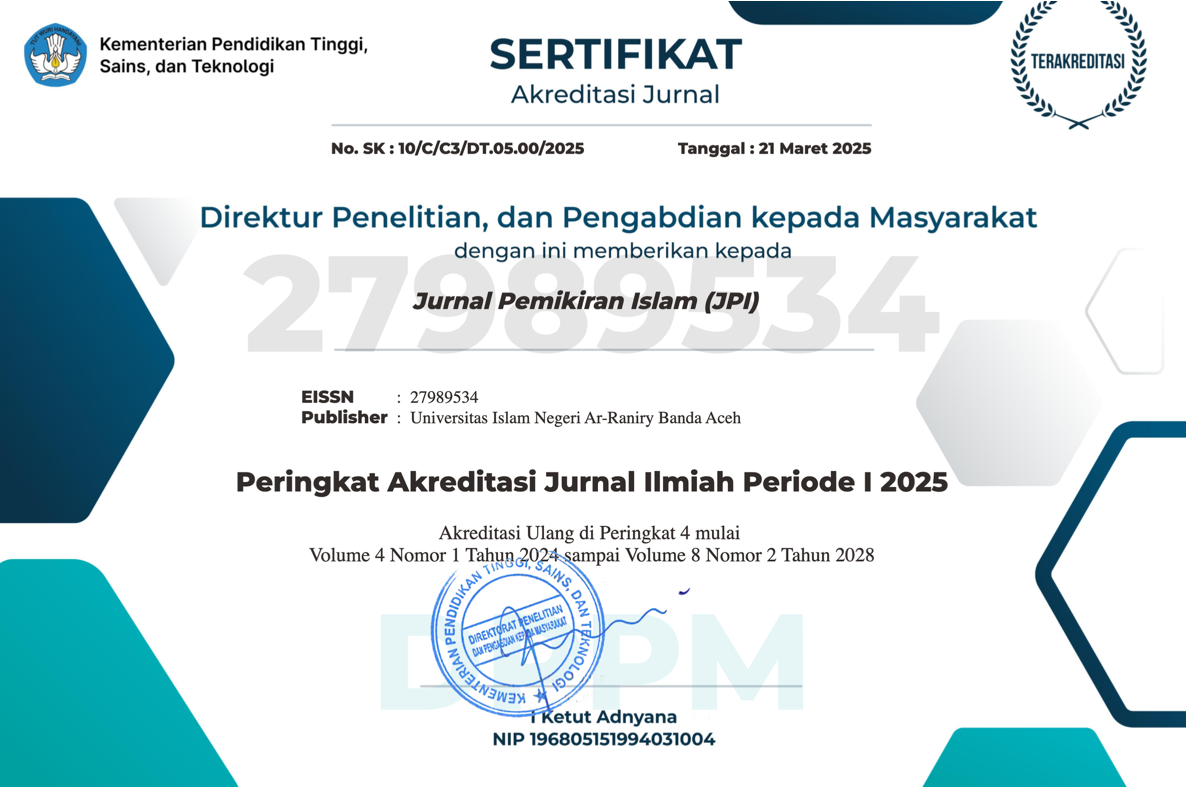The Tauhid of Imam Al-Asy’ari in The Malay Tradition: An Analysis of Faridat Al-Farāid by Sheikh Wan Ahmad bin Muhammad Zayn
DOI:
https://doi.org/10.22373/jpi.v4i2.27608Keywords:
Tauhid, Imam Al-Asy’ari, Faridat al-Farāid, attributes of AllahAbstract
This article aims to analyze the concept of tauhid (Islamic monotheism) according to Imam Al-Asy’ari as elaborated in the book Faridat al-Farāid fi ilmi al-‘Aqāid by Sheikh Wan Ahmad bin Muhammad Zayn , highlighting its relevance to the Islamic educational tradition in the Malay world. The study employs a descriptive-analytical method using a qualitative approach grounded in library research. The Faridat al-Farāid serves as the primary source, while secondary sources include theological references and scholarly works related to Imam Al-Asy’ari's concept of tauhid. The findings indicate that Imam Al-Asy’ari’s tauhid as presented in the Faridat al-Farāid encompasses three main aspects—dzāt (essence), sifat (attributes), and af’al (acts)—which are explained through 13 obligatory attributes, 13 impossible attributes, and one permissible attribute of Allah SWT. The book adopts a detailed (tafsili) approach to strengthen the understanding of tauhid while bridging textual and rational arguments in line with the Asy’ari school of thought. Furthermore, the book’s relevance lies in its role as a theological guide for traditional Islamic education in the Malay world, integrating textual and rational pedagogies. This study concludes that the Faridat al-Farāid not only reflects Imam Al-Asy’ari’s theological thought but also significantly contributes to Islamic education. Future studies are recommended to explore the application of Asy’ariyah theology in addressing contemporary challenges.
Downloads
References
Adryan, M., & Santalia, I. (2022). Aliran Asy’ariyah: Sebuah Kajian Historis Pengaruh Aliran Serta Pokok Teologinya. Innovative: Journal Of Social Science Research, 2(1), 754–759. https://doi.org/10.31004/innovative.v2i1.4846
al-Fatani, A. F. (2002). Ulama besar dari Patani. Universiti Kebangsaan Malaysia.
Bilal, P. A. A. (1994). The Fundamentals of Tawheed (Islamic Monotheism). In Riyadh: International Islamic Publishing House. Islamic Publishing House.
Hassan Basri, M. N., Shuhari, M. H., & Engku Wok Zin, E. I. (2019). Mukhalafatuhu li al-Hawadith Menurut Perspektif Shurrah Matan Jawharah al-Tawhid. Jurnal Akidah & Pemikiran Islam, 21(1), 53–84. https://doi.org/10.22452/afkar.vol21no1.2
Hasyim, M. S. (2005). AL- ASY’ARIYAH (STUDI TENTANG PEMIKIRAN AL-BAQILLANI, AL-JUWAINI, AL-GHAZALI). Hunafa: Jurnal Studia Islamika, 2(3), 209–224. https://doi.org/10.24239/JSI.VOL2.ISS3.317
Ibrahim, M. N. H., & Basmeih, S. A. M. (2001). Tafsir pimpinan ar-Rahman kepada pengertian al-Qur’an : (30 juz). Darulfikir.
Kounsar, A. (2016). The Concept of Tawhid in Islam: An Overview of the Perspectives of Some Prominent Muslim Scholars. Journal of Islamic Thought and Civilization, 06(02), 95–110. https://doi.org/10.32350/jitc.62.06
Makdisi, G. (1963). Ash’ari and the Ash’arites in Islamic Religious History II. Studia Islamica, 18, 19. https://doi.org/10.2307/1595177
Masrukhin, M. Y. (2021). The Will and the Presence of Human Being in Abu al-Hasan al-Ash’ari’s Thought: Explaining the Relation between Human and God in Kalam Discourse. Al-Jami’ah: Journal of Islamic Studies, 59(1), 221–254. https://doi.org/10.14421/ajis.2021.591.221-254
Muda, T. M. A. (2019). Pengantar Tauhid. Prenada Media.
Nasution, H. (2002). Teologi Islam: Aliranaliran, Sejarah, Analisa dan Perbandingan. Universitas Indonesia (UI Press).
Nata, A. (2008). Kajian Tematik Al-qur’an Tentang Ketuhanan. Angkasa.
Rabbani, M. I. (2019). Tauhid Ahlussunnah wal Jama’ah; Antara Imam al-Asyari dan Ibn Taymiyyah. Tasfiyah, 3(1), 1. https://doi.org/10.21111/tasfiyah.v3i1.2979
Rahman, T. (2013). Tauhid ilmu kalam. CV Pustaka Setia.
Rashidi Wahab, M., Hadzrullathfi, S., & Omar, S. (2013). Stages of Imam al-Ash’ari Thought in Theology. International Journal of Islamic Thought, 3, 58–70. http://www.ukm.my/ijit/
Shah, M. (2018). Tanzīh and Tashbīh in Classical Islamic Theological Thought. In Islamic Studies. Oxford University Press. https://doi.org/10.1093/obo/9780195390155-0251
Wahid, A., Shihab, Q., Rakhmat, J., Yafie, A., Nasution, H., & Hidayat, K. (1994). Kontekstualisasi doktrin Islam dalam sejarah. Yayasan Wakaf Paramadina.
Watt, W. M. (2019). Islamic Philosophy and Theology. Edinburgh University Press.
Zayn, T. A. bin M. (2021). Faridah al-Fara’id fi `Ilm al-`Aqa’id.
Downloads
Published
Issue
Section
License
Authors who publish in Jurnal Pemikiran Islam agree to the following terms:
- Authors retain copyright and grant the journal right of first publication with the work simultaneously licensed Attribution-NonCommercial-ShareAlike 4.0 International (CC BY-NC-SA 4.0) that allows others to share the work with an acknowledgment of the work's authorship and initial publication in this journal.
- Authors are able to enter into separate, additional contractual arrangements for the non-exclusive distribution of the journal's published version of the work (e.g., post it to an institutional repository or publish it in a book), with an acknowledgment of its initial publication in this journal.
- Authors are permitted and encouraged to post their work online (e.g., in institutional repositories or on their website) prior to and during the submission process, as it can lead to productive exchanges, as well as earlier and greater citation of published work. (See The Effect of Open Acces)














